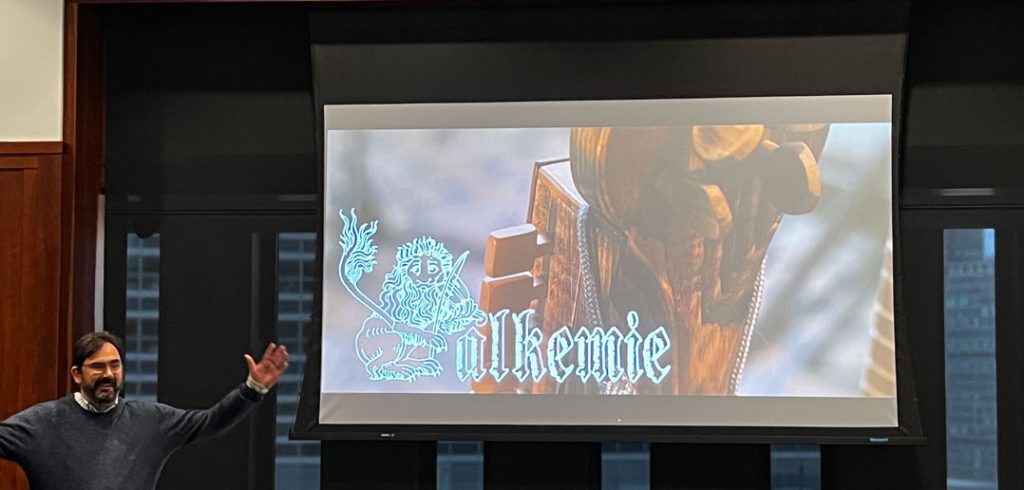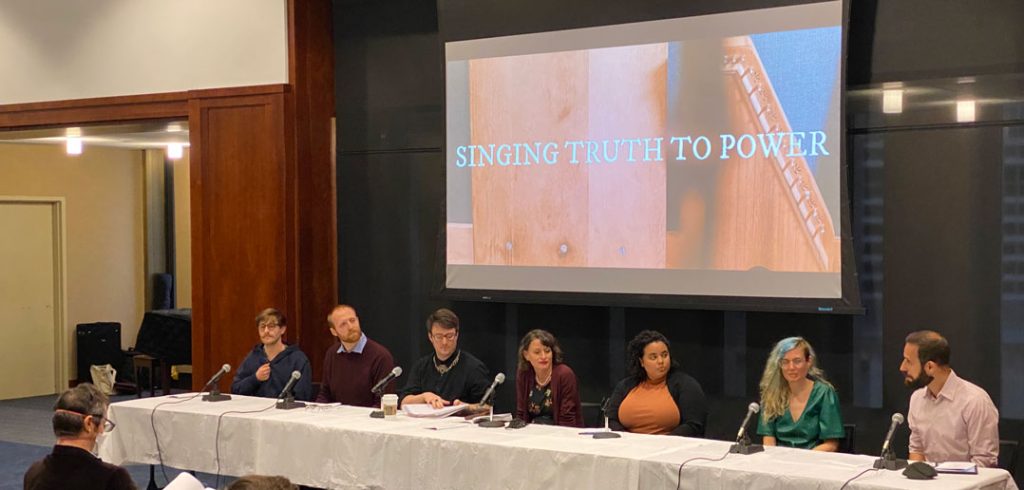At “Singing Truth to Power,” a medieval concert and roundtable discussion held on Oct. 5 at Fordham’s Lincoln Center campus, performers and scholars used medieval songs to connect the music of the middle ages to present day issues. They also reflected on how music can inspire people to take action.
The event was co-presented by Fordham’s Department of Art History and Music, Fordham’s Center for Medieval Studies, New York State’s Council on the Arts, and Alkemie, a medieval music ensemble group.
Some of the connections between today’s issues and medieval songs were made quite literally. As Alkemie performed medieval chants, Niccolo Seligmann, a performer with the group, inserted poems that added present-day commentary to the themes expressed in the songs.
“They tell us that their greed is good, tweeting atop the tower/They say, ‘work harder and you could join us and wield our power,” Seligmann recited between medieval songs, which were performed primarily in Old English and Old French. “They tell us their prosperity is earned through God’s just grace/They show the press their charity and warn us to pick up the pace. But those of us out on the streets engaged in mutual aid/can often barely make ends meet and expect no press parade.”

In the panel discussion that followed, Sian Ricketts, a performer with Alkemie, said the group has been trying to figure out how to best convey the messages, both past and current, in their work.
“Are we supposed to be making a political message as we engage with these materials of the past that are so overtly political? And we have to process what that means to project it into the world,” Ricketts said. “All the music on this program is all written by clerics, essentially people who are working in the system—they don’t have a lot of power; they had an education. And that’s the position we can really identify with, so I find it fascinating to grapple with that.”
Reflecting on Activism
For others, the concert made them reflect on their own activism and work in their daily lives.
“When I got the invitation to be a part of this panel, my initial reaction was to ask myself, ‘Am I an activist?’” Natalie Reynoso, a Ph.D. candidate studying the history of Christianity at Fordham said. “But I think for me, and maybe for many of us, the image of someone outside protesting is the image that often comes to mind. And it is not the way my activism looks in my work.”
Reynoso said the performance helped her reflect on how her work studying gendered violence in early Christianity can be considered activism.
“The questions that I ask are really where my activism comes in—who gets to be human in the ancient world and who doesn’t? Who gets left out? And my interest is in those who get left out and telling those stories,” she said.
Patrick DeBrosse, a Ph.D. candidate at Fordham currently studying the political culture of Latin Europe during the Middle Ages, said that the performance reminded him of one of his biggest sources for his dissertation—the music of troubadours from that time period.
“It’s full of protests essentially,” he said. “It’s one of the few places that you can really get perspectives on power, you can get critiques of power… I think this performance was a great way for me to sort of reflect back on the relationship between my sources and protest in general—who gets to protest? What’s the purpose of it?”
DeBrosse also said that the concert made him think back to how music was used in history to bring attention to an issue and “draw a crowd” around a performance.
“Sometimes I think we in the modern world forget that music does this so powerfully because we consume it through headphones,” he said. “In a pre modern society, all of the things we just heard are intended to be consumed, with a much bigger crowd of people who have chosen to … listen to and then go on to presumably comment on whatever message has been given to them by the singer.”
Nicholas Paul, Ph.D., an associate professor of history and the director of the Center for Medieval Studies, said that the “lasting partnership” between the center, Fordham, and Alkemie has been very beneficial and has led to many “great events.”.
“It’s a great joy to be able to see that continuing, to be able to benefit from that partnership by being able to have events like this evening where we premiere new work,” he said.

